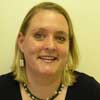For additional interviews with AIDS activists and people living with HIV, as well as a 30-minute radio program produced by Human Rights Watch for the International AIDS Conference, click here:
Human
Rights Watch recorded the personal stories of leading HIV/AIDS activists
from around the world. We wanted to know what inspires them to do the
work they do, and how the epidemic particularly affects their communities.
Here, you’ll hear about when these changemakers first heard the
word “AIDS,” and what they’d like to see at the 16th
Annual International AIDS Conference in Toronto. Twenty-five years into
the start of the epidemic, what’s the future of fight against AIDS?
This is what they said: |
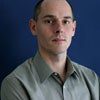 |
Joseph Amon, United States
Human Rights Watch
 Commentary on the 16th Annual International AIDS Conference (2:26) Commentary on the 16th Annual International AIDS Conference (2:26)
Joseph Amon is Director of Human Rights Watch’s HIV/AIDS program.
“The most important thing that needs to happen in the AIDS epidemic is… to adopt policies that are science based and that are rights based, and that the current trend of ideological and moralistic approaches are abandoned."
|
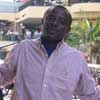 |
Omololu
Falobi, Nigeria
Journalists Against AIDS (JAAIDS)
website
Human Rights Watch mourns the unexpected death of Omololu Falobi. He was killed the evening of Thursday, October 5th having just spoken to young entrepreneurs on the importance of social responsibility. He is survived by his wife and two young children. Ron MacInnis of Internews said of Falobi, “His legacy speaks for itself...but his departure from us leaves a great void."
We thank Falobi for his dedication and hard work.
 Personal Story (5:26) Download Commentary
(4:46) Download Personal Story (5:26) Download Commentary
(4:46) Download
Omololu Falobi is Executive Director of the non-governmental organization
Journalists Against AIDS in Lagos, Nigeria. He believes that media coverage
about HIV/AIDS is essential in the developing an effective response to
the AIDS epidemic.
“We’d like to see evidence that the world is not discriminating against
Africa by ensuring that when there are new treatments, that they are made available
to Africans promptly.”
|
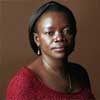 |
Beatrice Were, Uganda
National Community of Women Living With AIDS (NACWOLA)
 Personal Story (3:28)
Download Commentary (2:51)
Download Personal Story (3:28)
Download Commentary (2:51)
Download
Beatrice Were co-founded NACWOLA after she came out publically with her HIV status. Despite experiencing discrimination and stigma, she has remained active in fighting for the rights of those with HIV/AIDS.
“My hope coming from Uganda, coming from Africa, being a mother living with HIV, is that we can realize universal access to treatment; that we can come out of this conference with that goal, and to see less of the rhetoric that has happened over the last few years.” |
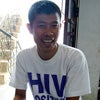 |
Loon Gangte,
India
President of Dehli Network of Positive People
 Personal Story (5:53) Download Commentary (1:49) Download Personal Story (5:53) Download Commentary (1:49) Download
Loon Gangte found out he was HIV positive while he was in drug rehabilitation in 1997. Within months, he started speaking out about his status. Now he is the President of Dehli Network of Positive People, and the Coordinator of the Collaborative Fund for South Asia.
“For me, HIV is saving my life. Had I not knew my status in 1997, I might still continue to use drugs and died by now…Life is the most important. [My work is] not about treatment, it’s not about activism or fighting with the government. It’s about saving people’s lives.” |
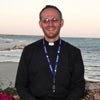 |
Father
JP Heath, South Africa
African Network of Religious Leaders Living
with AIDS (ANARELA)
 Personal Story (7:19) Download
Commentary
(4:07) Download Personal Story (7:19) Download
Commentary
(4:07) Download
Father JP Heath is the General Secretary of ANARELA, helping to found the
organization after learning he was HIV positive. He travels throughout
Africa to speak out against stigmatization and to provide support for other
positive religious leaders.
“There is no way in which the world can approach this without the full
integration of, on the one side, people living with HIV and other side the faith
community.” |
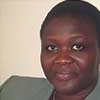 |
Rolake
Odetoyinbo, Nigeria.
Positive Action for Treatment Access, (PATA)
website
 Personal Story (4:45) Download Commentary
(2:48) Download Personal Story (4:45) Download Commentary
(2:48) Download
Rolake Odetoyinbo says she founded PATA because she was tired of living
in silence after discovering her HIV status in 1998. Shortly after she
attended her first International AIDS conference, she started making national
television and print media appearances.
“The first conference I attended, Barcelona, is what jumpstarted me into disclosing
my status. It was the first time I came into contact with concepts like “positive
and not ashamed.” For me it was totally empowering. Did I learn anything from
those scientific workshops? I didn’t learn one thing, and that’s the truth.” |
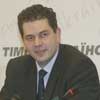 |
Andriy
Klepikov, Ukraine
AIDS Alliance, Ukraine
website
 Personal Story (4:50) Download Commentary
(1:55) Download Personal Story (4:50) Download Commentary
(1:55) Download
Andriy Klepikov is Executive Director of AIDS Alliance in Ukraine. Ukraine
has one of the fastest growing AIDS prevalence rate in Eastern Europe and
Central Asia.
“This conference will give a learning opportunity to almost every country
to find a way how to fuel, technically, universal access. What to do, what new
things, what innovations to apply, to implement…so it’s a really
great sharing opportunity.” |
 |
Allan Clear,
United States.
Harm Reduction Coalition (HRC)
website
 Personal Story (5:48) Download Commentary
(2:26) Download Personal Story (5:48) Download Commentary
(2:26) Download
Allan Clear is Executive Director of the Harm Reduction Coalition, a national
organization committed to reducing drug-related harm.
“Media is another thing that should come out of this conference. AIDS is on the
back burner in the United States. When we talk about AIDS in the US, we talk
about Africa, and every so often in Asia. The epidemic that is taking place in
Central and Eastern Europe is pretty much ignored…I’d like to see some kind of
impetus come out of the conference that will stimulate more action.” |
| |
Grace Sediou,
Botswana
Bomme-Ifago Association, International
Community of Women Living with HIV/AIDS (ICW)
 Personal Story (5:26) Download Commentary
(2:39) Download Personal Story (5:26) Download Commentary
(2:39) Download
Grace Sediou found out she was HIV positive in 2002. She joined the Botswana
Network of People living with HIV and AIDS, then formed her own organization,
Bomme-Ifago to serve the specific needs of positive women. The group works
with Parliamentarians to advocate better access to health care for women.
“Scientists need experience with people who are living with the virus to tell
them what is happening in their body - that’s when they can make vaccines depending
on what is happening with us.” |
 |
Wan Yanhai,
China.
AIZHI (AIDS) Action Project
website
 Listen
(1:29) Listen
(1:29)
Dr. Wan Yanhai is founder and coordinator of the AIZHI Action Project in
Beijing. Despite government hostility, including detention, Dr. Yanhai
continues to speak out for the rights of marginalized groups living with
HIV.
“I hope that the international AIDS conference will become an opportunity for
every government to make a commitment to the world, to people. But not a place
for people to make political shows.” |
|
Christine
Stegling, Botswana
Botswana Network on Ethics, Law and HIV/AIDS (BONELA)
website
 Listen
(4:04) Listen
(4:04)
Christine Stegling moved to Botswana from Germany in the early 1990s. Her
organization, BONELA, works on issues such as HIV/AIDS and employment,
rights for pregnant women with HIV, and confidentiality for positive people.
It has a legal aid clinic and a media program
“They think Human Rights is something you
discuss on the periphery for good measure, but it is at the very
core of what all of us do…Developing a vaccine is not
the magic bullet.” |
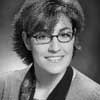 |
Jodi Jacobson,
United States.
Center for Health and Gender Equity (CHANGE)
website
 Listen
(2:19) Listen
(2:19)
Jodi Jacobson has a long trajectory of working for reproductive
health and gender rights. CHANGE works to change US International
policy to support the human rights of those living with HIV/AIDS.
“We make a mistake by saying only ‘what will come out of it with people living
with HIV/AIDS,” I think we need to be thinking about this as all of us - those
of us at risk and those of us living with.” |
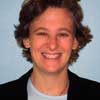 |
Nina Schwalbe,
United States
Global Alliance for TB Drug Development
(TB Alliance)
website
 Listen
(2:03) Listen
(2:03)
Nina Schwalbe is Policy Director of TB Alliance, which is working to develop
a tuberculosis treatment regimen compatible with the HIV regimen. Tuberculosis
is the leading infectious killer of those living with HIV/AIDS globally.
"I would like to see sufficient attention to the dramatic need to address
TB/HIV co-infection…It’s a ridiculous thing that AIDS patients die
of TB. It’s completely unnecessary. It’s time to force these two
systems to work together.” |
| |
Kieran
Daly, Canada
International Council of AIDS Service Organizations
(ICASO)
website
 Listen
(3:25) Listen
(3:25)
Kieran Daly is Director, Policy & Communications at ICASO, what he describes
as a “network of networks.” ICASO strives to strengthen community mobilization
and advocacy around HIV and AIDS. It is also one of the co-organizers of
16th Annual International AIDS conference in Toronto.
“Key issues at the moment are challenging some of the policies of the US government
that many people feel are undermining the response. And if this conference can
come out with key messages about what we as a broader community think is good
practice, I think that would be really good. The theme of the conference is time
to deliver. So, it’s time to deliver on what we know works.” |
| |
Susie
McLean, United Kingdom
International AIDS Alliance
website
 Listen
(3:56) Listen
(3:56)
Susie McLean is Senior Policy Advisor at the International AIDS alliance.
The alliance is an initiative of people, organizations and communities
working towards a shared vision by supporting effective community responses
to HIV and AIDS.
“One of the things that as a global response we are really weak at is understanding
and creating and implementing interventions to address discrimination… and if
the focus of the conference were a work program about a list of key interventions,
about a significant injection of financing for stigma and discrimination interventions,
it could be a very powerful thing.” |












